ENGL 103: Analyzing Colonization Effects Through Dialogue of Authors
VerifiedAdded on 2023/01/17
|9
|2629
|89
Essay
AI Summary
This essay fulfills the assignment brief by presenting an imagined conversation between Jamaica Kincaid, author of "A Small Place," and Amir Nizar Zaubi, author of "I Am Yusuf and This Is My Brother." The dialogue, structured as a script, explores the effects of colonization, drawing parallels between the experiences of Antigua (Kincaid's home) and Palestine (Zaubi's background). The conversation delves into themes of freedom, the lasting impact of being ruled, cultural identity, the psychological effects of colonization, and the challenges of post-colonial societies. Kincaid and Zaubi discuss their personal experiences, their writings, and the shared struggles of their respective homelands. The essay highlights the irony of using the colonizer's language to critique colonization, the impact of tourism, and the search for identity in the aftermath of oppression, providing a comparative analysis of their perspectives on geo-politics and the consequences of colonization. The conversation also touches upon the historical context of the Atlantic slave trade and the origins of Palestine, enriching the exploration of the topic.

Running head: COLONIZATION EFFECTS
COLONIZATION EFFECTS
Name of the Student:
Name of the University:
Author Note:
COLONIZATION EFFECTS
Name of the Student:
Name of the University:
Author Note:
Paraphrase This Document
Need a fresh take? Get an instant paraphrase of this document with our AI Paraphraser
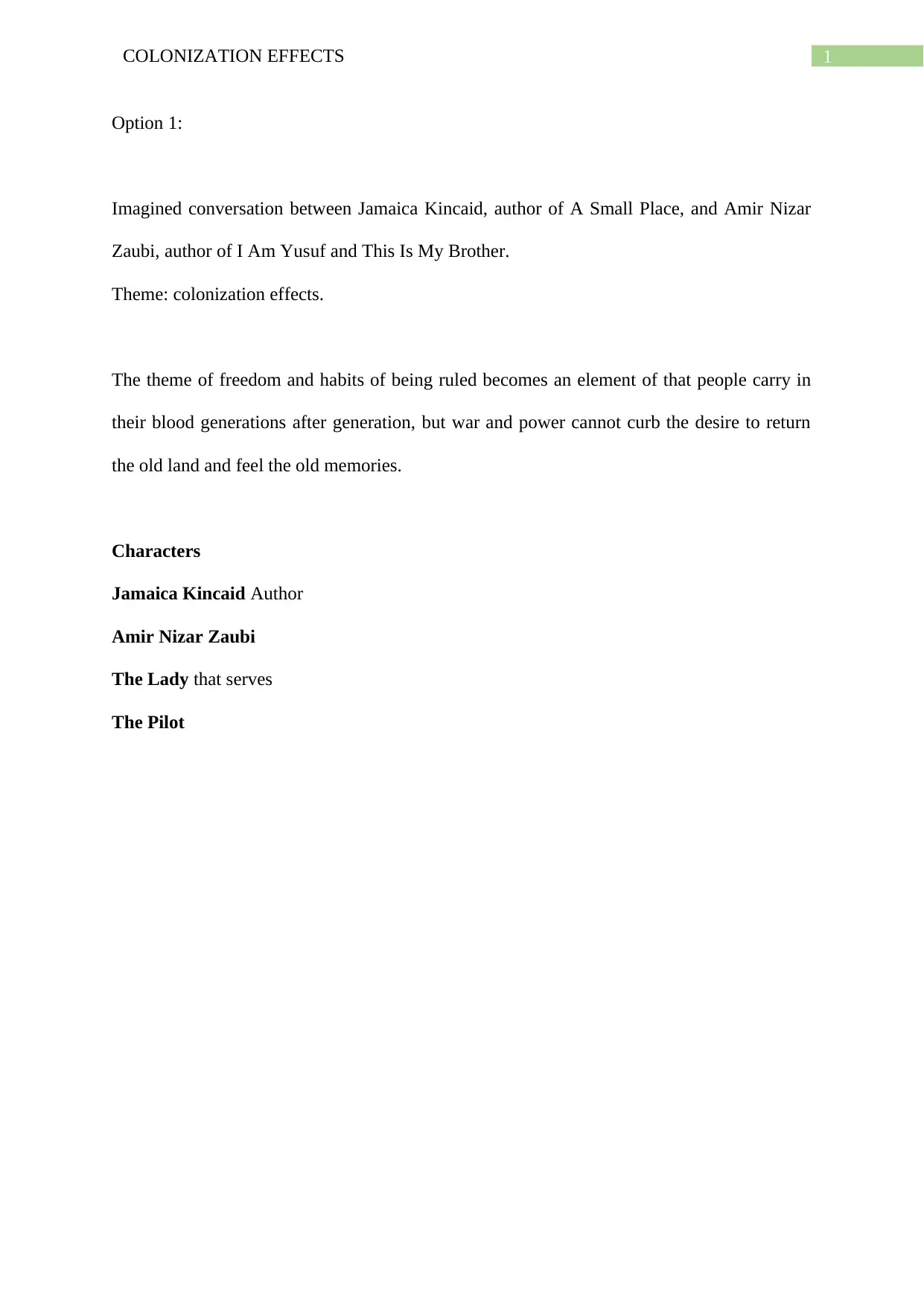
1COLONIZATION EFFECTS
Option 1:
Imagined conversation between Jamaica Kincaid, author of A Small Place, and Amir Nizar
Zaubi, author of I Am Yusuf and This Is My Brother.
Theme: colonization effects.
The theme of freedom and habits of being ruled becomes an element of that people carry in
their blood generations after generation, but war and power cannot curb the desire to return
the old land and feel the old memories.
Characters
Jamaica Kincaid Author
Amir Nizar Zaubi
The Lady that serves
The Pilot
Option 1:
Imagined conversation between Jamaica Kincaid, author of A Small Place, and Amir Nizar
Zaubi, author of I Am Yusuf and This Is My Brother.
Theme: colonization effects.
The theme of freedom and habits of being ruled becomes an element of that people carry in
their blood generations after generation, but war and power cannot curb the desire to return
the old land and feel the old memories.
Characters
Jamaica Kincaid Author
Amir Nizar Zaubi
The Lady that serves
The Pilot
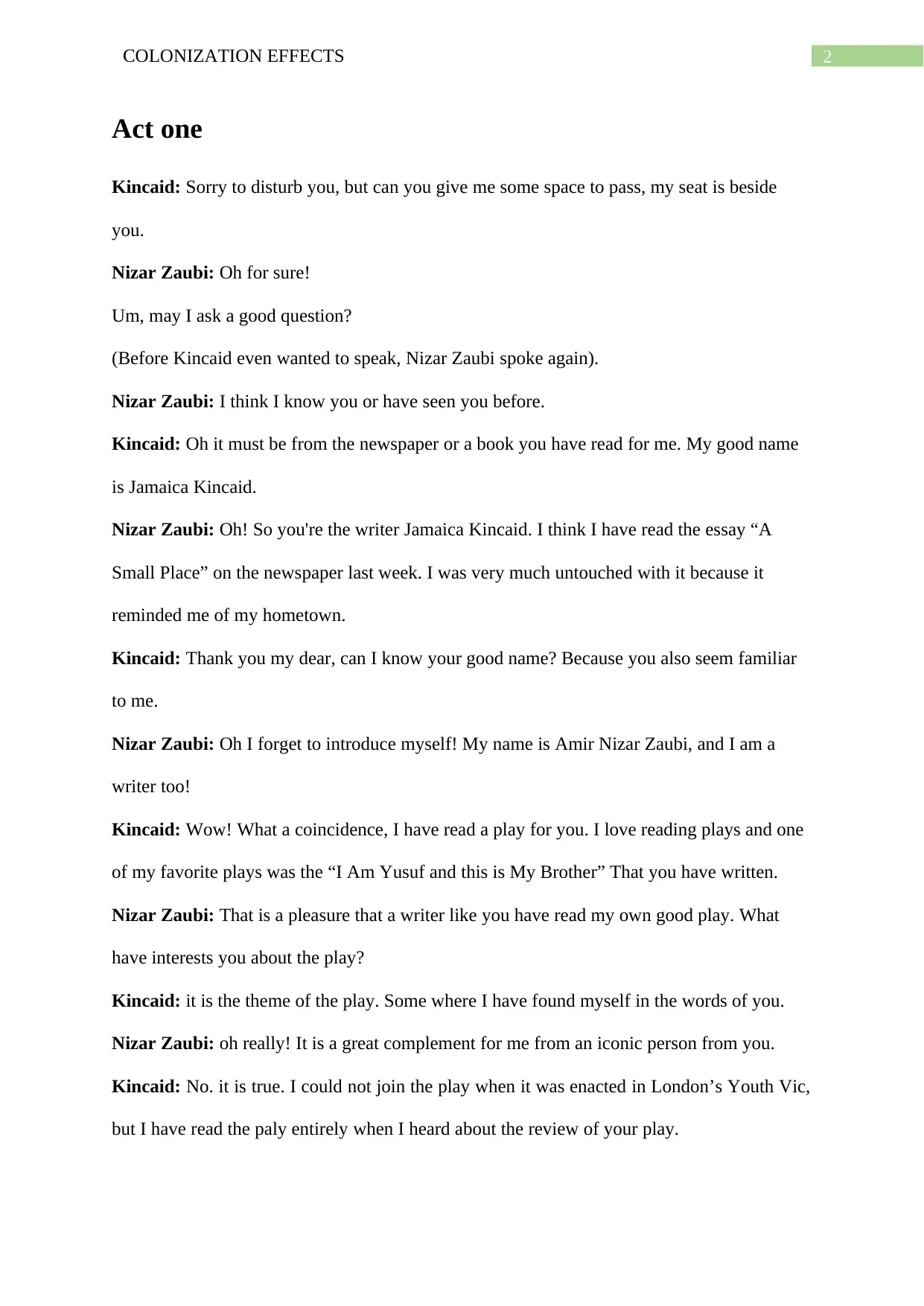
2COLONIZATION EFFECTS
Act one
Kincaid: Sorry to disturb you, but can you give me some space to pass, my seat is beside
you.
Nizar Zaubi: Oh for sure!
Um, may I ask a good question?
(Before Kincaid even wanted to speak, Nizar Zaubi spoke again).
Nizar Zaubi: I think I know you or have seen you before.
Kincaid: Oh it must be from the newspaper or a book you have read for me. My good name
is Jamaica Kincaid.
Nizar Zaubi: Oh! So you're the writer Jamaica Kincaid. I think I have read the essay “A
Small Place” on the newspaper last week. I was very much untouched with it because it
reminded me of my hometown.
Kincaid: Thank you my dear, can I know your good name? Because you also seem familiar
to me.
Nizar Zaubi: Oh I forget to introduce myself! My name is Amir Nizar Zaubi, and I am a
writer too!
Kincaid: Wow! What a coincidence, I have read a play for you. I love reading plays and one
of my favorite plays was the “I Am Yusuf and this is My Brother” That you have written.
Nizar Zaubi: That is a pleasure that a writer like you have read my own good play. What
have interests you about the play?
Kincaid: it is the theme of the play. Some where I have found myself in the words of you.
Nizar Zaubi: oh really! It is a great complement for me from an iconic person from you.
Kincaid: No. it is true. I could not join the play when it was enacted in London’s Youth Vic,
but I have read the paly entirely when I heard about the review of your play.
Act one
Kincaid: Sorry to disturb you, but can you give me some space to pass, my seat is beside
you.
Nizar Zaubi: Oh for sure!
Um, may I ask a good question?
(Before Kincaid even wanted to speak, Nizar Zaubi spoke again).
Nizar Zaubi: I think I know you or have seen you before.
Kincaid: Oh it must be from the newspaper or a book you have read for me. My good name
is Jamaica Kincaid.
Nizar Zaubi: Oh! So you're the writer Jamaica Kincaid. I think I have read the essay “A
Small Place” on the newspaper last week. I was very much untouched with it because it
reminded me of my hometown.
Kincaid: Thank you my dear, can I know your good name? Because you also seem familiar
to me.
Nizar Zaubi: Oh I forget to introduce myself! My name is Amir Nizar Zaubi, and I am a
writer too!
Kincaid: Wow! What a coincidence, I have read a play for you. I love reading plays and one
of my favorite plays was the “I Am Yusuf and this is My Brother” That you have written.
Nizar Zaubi: That is a pleasure that a writer like you have read my own good play. What
have interests you about the play?
Kincaid: it is the theme of the play. Some where I have found myself in the words of you.
Nizar Zaubi: oh really! It is a great complement for me from an iconic person from you.
Kincaid: No. it is true. I could not join the play when it was enacted in London’s Youth Vic,
but I have read the paly entirely when I heard about the review of your play.
⊘ This is a preview!⊘
Do you want full access?
Subscribe today to unlock all pages.

Trusted by 1+ million students worldwide
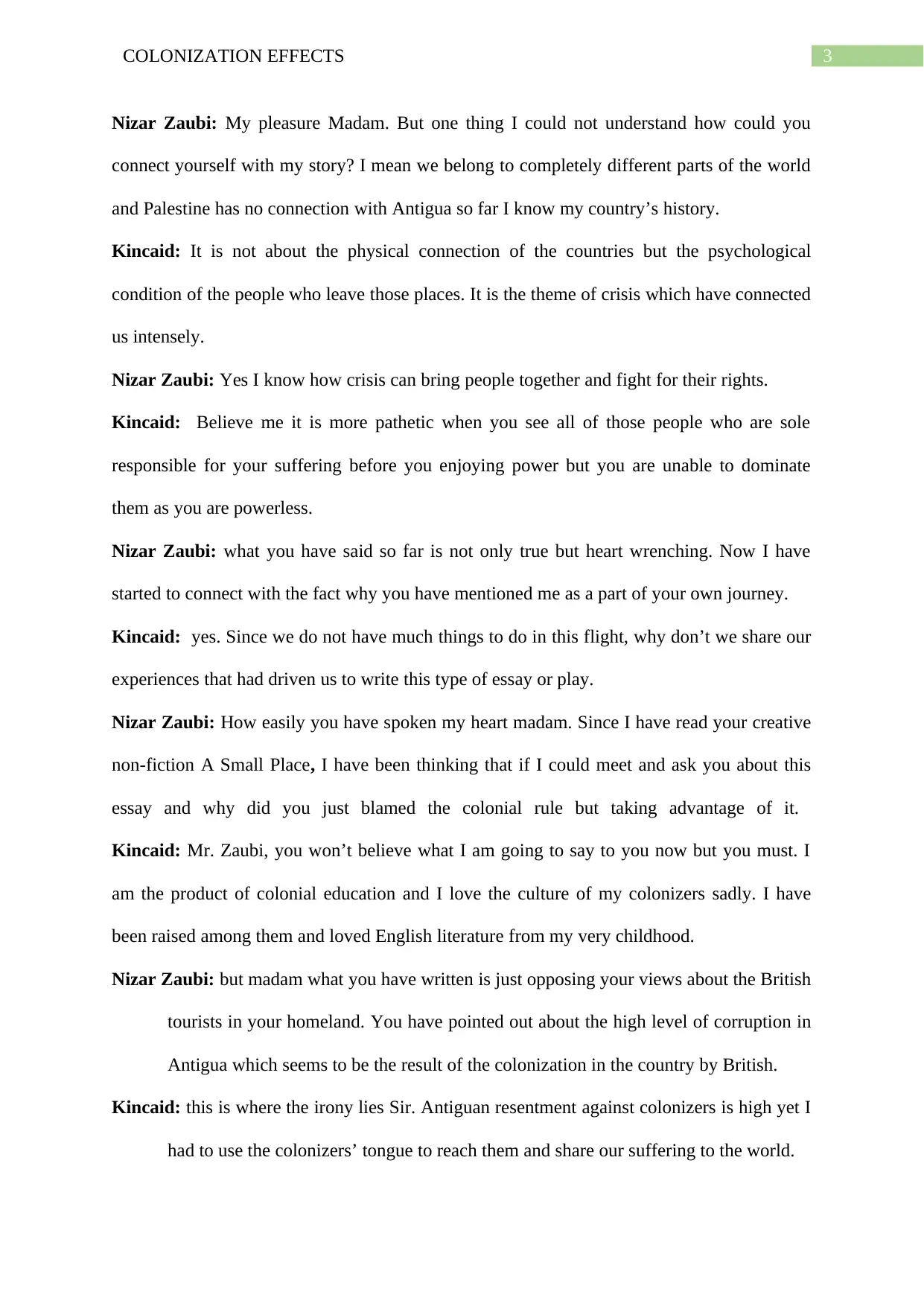
3COLONIZATION EFFECTS
Nizar Zaubi: My pleasure Madam. But one thing I could not understand how could you
connect yourself with my story? I mean we belong to completely different parts of the world
and Palestine has no connection with Antigua so far I know my country’s history.
Kincaid: It is not about the physical connection of the countries but the psychological
condition of the people who leave those places. It is the theme of crisis which have connected
us intensely.
Nizar Zaubi: Yes I know how crisis can bring people together and fight for their rights.
Kincaid: Believe me it is more pathetic when you see all of those people who are sole
responsible for your suffering before you enjoying power but you are unable to dominate
them as you are powerless.
Nizar Zaubi: what you have said so far is not only true but heart wrenching. Now I have
started to connect with the fact why you have mentioned me as a part of your own journey.
Kincaid: yes. Since we do not have much things to do in this flight, why don’t we share our
experiences that had driven us to write this type of essay or play.
Nizar Zaubi: How easily you have spoken my heart madam. Since I have read your creative
non-fiction A Small Place, I have been thinking that if I could meet and ask you about this
essay and why did you just blamed the colonial rule but taking advantage of it.
Kincaid: Mr. Zaubi, you won’t believe what I am going to say to you now but you must. I
am the product of colonial education and I love the culture of my colonizers sadly. I have
been raised among them and loved English literature from my very childhood.
Nizar Zaubi: but madam what you have written is just opposing your views about the British
tourists in your homeland. You have pointed out about the high level of corruption in
Antigua which seems to be the result of the colonization in the country by British.
Kincaid: this is where the irony lies Sir. Antiguan resentment against colonizers is high yet I
had to use the colonizers’ tongue to reach them and share our suffering to the world.
Nizar Zaubi: My pleasure Madam. But one thing I could not understand how could you
connect yourself with my story? I mean we belong to completely different parts of the world
and Palestine has no connection with Antigua so far I know my country’s history.
Kincaid: It is not about the physical connection of the countries but the psychological
condition of the people who leave those places. It is the theme of crisis which have connected
us intensely.
Nizar Zaubi: Yes I know how crisis can bring people together and fight for their rights.
Kincaid: Believe me it is more pathetic when you see all of those people who are sole
responsible for your suffering before you enjoying power but you are unable to dominate
them as you are powerless.
Nizar Zaubi: what you have said so far is not only true but heart wrenching. Now I have
started to connect with the fact why you have mentioned me as a part of your own journey.
Kincaid: yes. Since we do not have much things to do in this flight, why don’t we share our
experiences that had driven us to write this type of essay or play.
Nizar Zaubi: How easily you have spoken my heart madam. Since I have read your creative
non-fiction A Small Place, I have been thinking that if I could meet and ask you about this
essay and why did you just blamed the colonial rule but taking advantage of it.
Kincaid: Mr. Zaubi, you won’t believe what I am going to say to you now but you must. I
am the product of colonial education and I love the culture of my colonizers sadly. I have
been raised among them and loved English literature from my very childhood.
Nizar Zaubi: but madam what you have written is just opposing your views about the British
tourists in your homeland. You have pointed out about the high level of corruption in
Antigua which seems to be the result of the colonization in the country by British.
Kincaid: this is where the irony lies Sir. Antiguan resentment against colonizers is high yet I
had to use the colonizers’ tongue to reach them and share our suffering to the world.
Paraphrase This Document
Need a fresh take? Get an instant paraphrase of this document with our AI Paraphraser
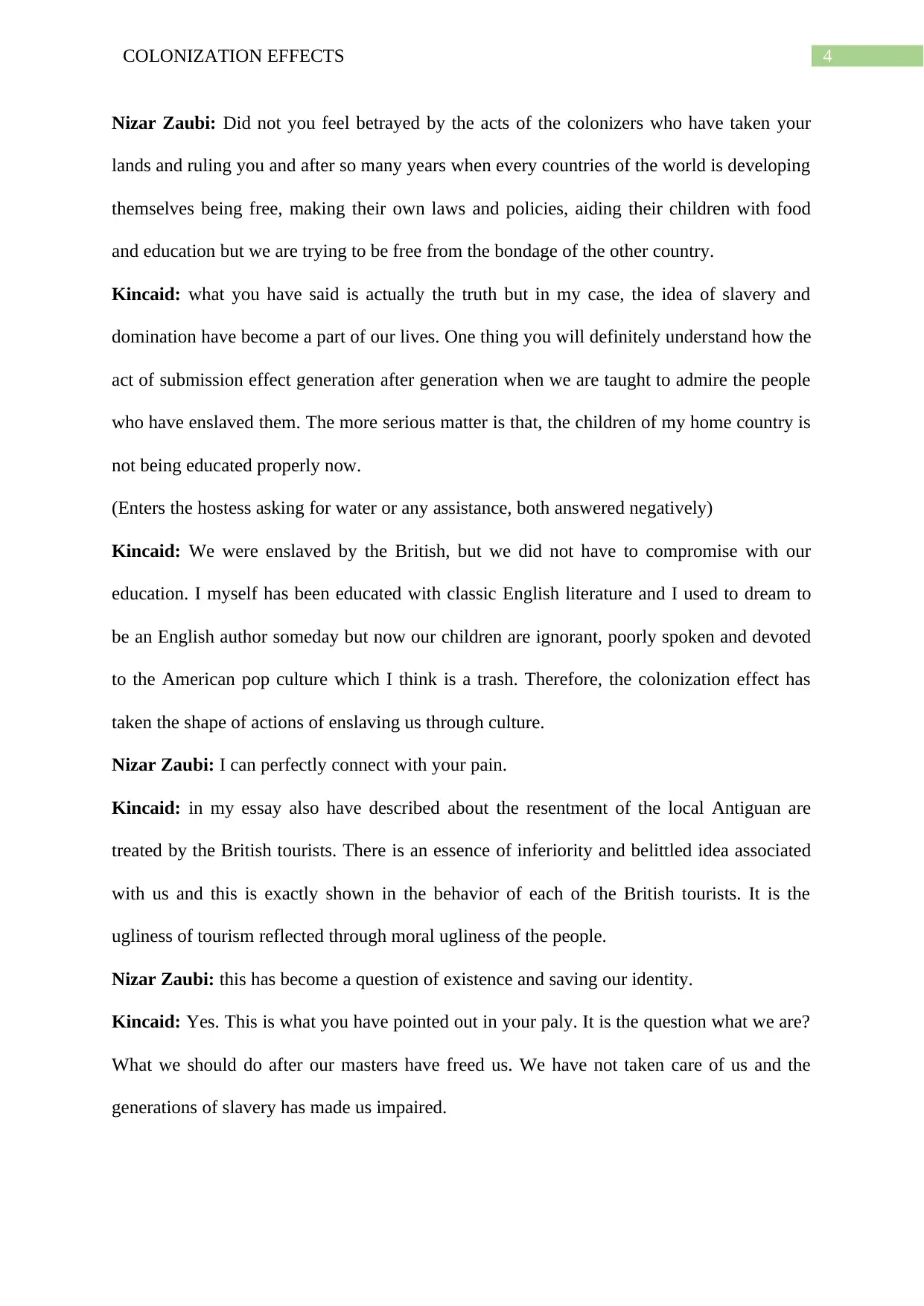
4COLONIZATION EFFECTS
Nizar Zaubi: Did not you feel betrayed by the acts of the colonizers who have taken your
lands and ruling you and after so many years when every countries of the world is developing
themselves being free, making their own laws and policies, aiding their children with food
and education but we are trying to be free from the bondage of the other country.
Kincaid: what you have said is actually the truth but in my case, the idea of slavery and
domination have become a part of our lives. One thing you will definitely understand how the
act of submission effect generation after generation when we are taught to admire the people
who have enslaved them. The more serious matter is that, the children of my home country is
not being educated properly now.
(Enters the hostess asking for water or any assistance, both answered negatively)
Kincaid: We were enslaved by the British, but we did not have to compromise with our
education. I myself has been educated with classic English literature and I used to dream to
be an English author someday but now our children are ignorant, poorly spoken and devoted
to the American pop culture which I think is a trash. Therefore, the colonization effect has
taken the shape of actions of enslaving us through culture.
Nizar Zaubi: I can perfectly connect with your pain.
Kincaid: in my essay also have described about the resentment of the local Antiguan are
treated by the British tourists. There is an essence of inferiority and belittled idea associated
with us and this is exactly shown in the behavior of each of the British tourists. It is the
ugliness of tourism reflected through moral ugliness of the people.
Nizar Zaubi: this has become a question of existence and saving our identity.
Kincaid: Yes. This is what you have pointed out in your paly. It is the question what we are?
What we should do after our masters have freed us. We have not taken care of us and the
generations of slavery has made us impaired.
Nizar Zaubi: Did not you feel betrayed by the acts of the colonizers who have taken your
lands and ruling you and after so many years when every countries of the world is developing
themselves being free, making their own laws and policies, aiding their children with food
and education but we are trying to be free from the bondage of the other country.
Kincaid: what you have said is actually the truth but in my case, the idea of slavery and
domination have become a part of our lives. One thing you will definitely understand how the
act of submission effect generation after generation when we are taught to admire the people
who have enslaved them. The more serious matter is that, the children of my home country is
not being educated properly now.
(Enters the hostess asking for water or any assistance, both answered negatively)
Kincaid: We were enslaved by the British, but we did not have to compromise with our
education. I myself has been educated with classic English literature and I used to dream to
be an English author someday but now our children are ignorant, poorly spoken and devoted
to the American pop culture which I think is a trash. Therefore, the colonization effect has
taken the shape of actions of enslaving us through culture.
Nizar Zaubi: I can perfectly connect with your pain.
Kincaid: in my essay also have described about the resentment of the local Antiguan are
treated by the British tourists. There is an essence of inferiority and belittled idea associated
with us and this is exactly shown in the behavior of each of the British tourists. It is the
ugliness of tourism reflected through moral ugliness of the people.
Nizar Zaubi: this has become a question of existence and saving our identity.
Kincaid: Yes. This is what you have pointed out in your paly. It is the question what we are?
What we should do after our masters have freed us. We have not taken care of us and the
generations of slavery has made us impaired.
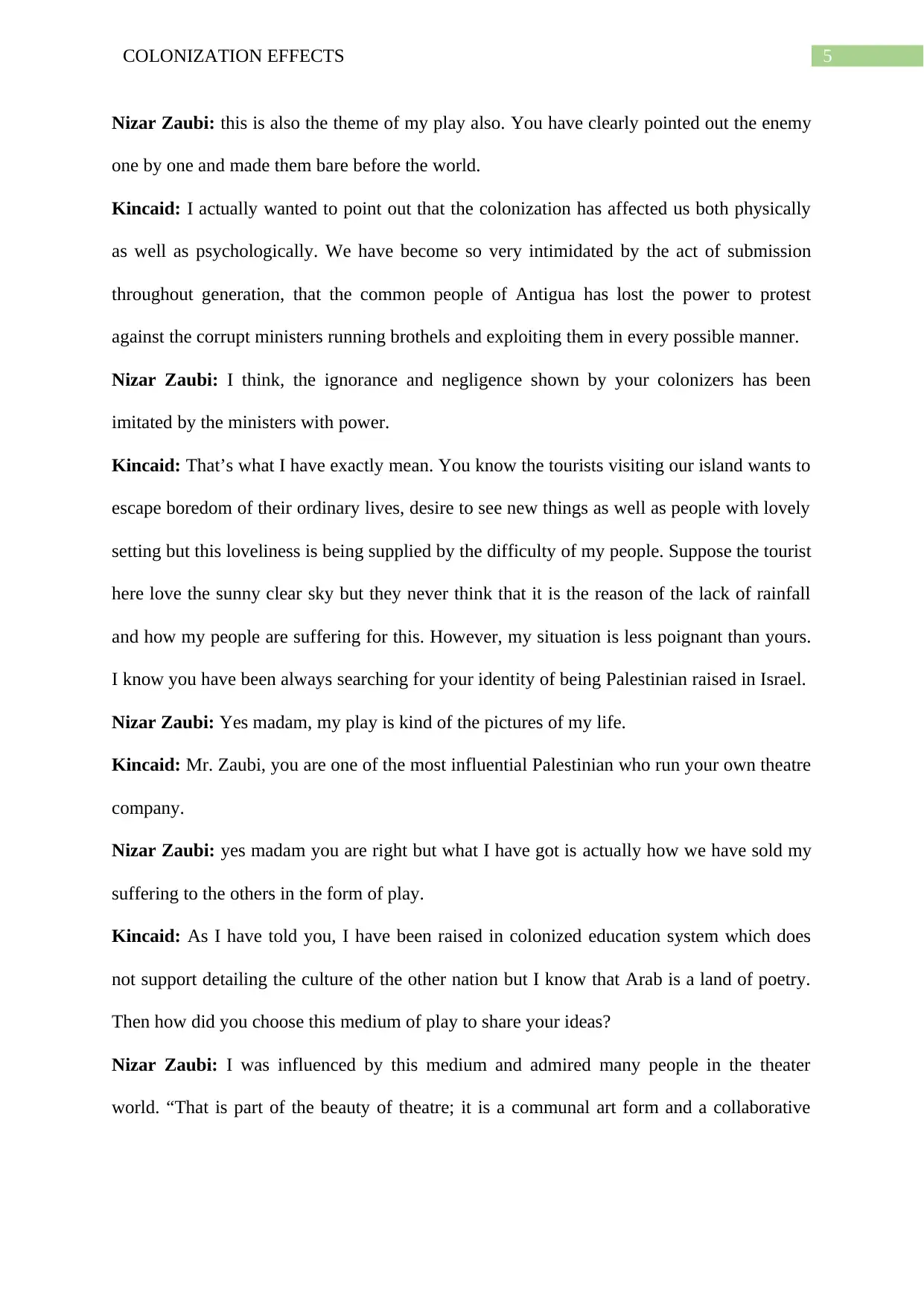
5COLONIZATION EFFECTS
Nizar Zaubi: this is also the theme of my play also. You have clearly pointed out the enemy
one by one and made them bare before the world.
Kincaid: I actually wanted to point out that the colonization has affected us both physically
as well as psychologically. We have become so very intimidated by the act of submission
throughout generation, that the common people of Antigua has lost the power to protest
against the corrupt ministers running brothels and exploiting them in every possible manner.
Nizar Zaubi: I think, the ignorance and negligence shown by your colonizers has been
imitated by the ministers with power.
Kincaid: That’s what I have exactly mean. You know the tourists visiting our island wants to
escape boredom of their ordinary lives, desire to see new things as well as people with lovely
setting but this loveliness is being supplied by the difficulty of my people. Suppose the tourist
here love the sunny clear sky but they never think that it is the reason of the lack of rainfall
and how my people are suffering for this. However, my situation is less poignant than yours.
I know you have been always searching for your identity of being Palestinian raised in Israel.
Nizar Zaubi: Yes madam, my play is kind of the pictures of my life.
Kincaid: Mr. Zaubi, you are one of the most influential Palestinian who run your own theatre
company.
Nizar Zaubi: yes madam you are right but what I have got is actually how we have sold my
suffering to the others in the form of play.
Kincaid: As I have told you, I have been raised in colonized education system which does
not support detailing the culture of the other nation but I know that Arab is a land of poetry.
Then how did you choose this medium of play to share your ideas?
Nizar Zaubi: I was influenced by this medium and admired many people in the theater
world. “That is part of the beauty of theatre; it is a communal art form and a collaborative
Nizar Zaubi: this is also the theme of my play also. You have clearly pointed out the enemy
one by one and made them bare before the world.
Kincaid: I actually wanted to point out that the colonization has affected us both physically
as well as psychologically. We have become so very intimidated by the act of submission
throughout generation, that the common people of Antigua has lost the power to protest
against the corrupt ministers running brothels and exploiting them in every possible manner.
Nizar Zaubi: I think, the ignorance and negligence shown by your colonizers has been
imitated by the ministers with power.
Kincaid: That’s what I have exactly mean. You know the tourists visiting our island wants to
escape boredom of their ordinary lives, desire to see new things as well as people with lovely
setting but this loveliness is being supplied by the difficulty of my people. Suppose the tourist
here love the sunny clear sky but they never think that it is the reason of the lack of rainfall
and how my people are suffering for this. However, my situation is less poignant than yours.
I know you have been always searching for your identity of being Palestinian raised in Israel.
Nizar Zaubi: Yes madam, my play is kind of the pictures of my life.
Kincaid: Mr. Zaubi, you are one of the most influential Palestinian who run your own theatre
company.
Nizar Zaubi: yes madam you are right but what I have got is actually how we have sold my
suffering to the others in the form of play.
Kincaid: As I have told you, I have been raised in colonized education system which does
not support detailing the culture of the other nation but I know that Arab is a land of poetry.
Then how did you choose this medium of play to share your ideas?
Nizar Zaubi: I was influenced by this medium and admired many people in the theater
world. “That is part of the beauty of theatre; it is a communal art form and a collaborative
⊘ This is a preview!⊘
Do you want full access?
Subscribe today to unlock all pages.

Trusted by 1+ million students worldwide
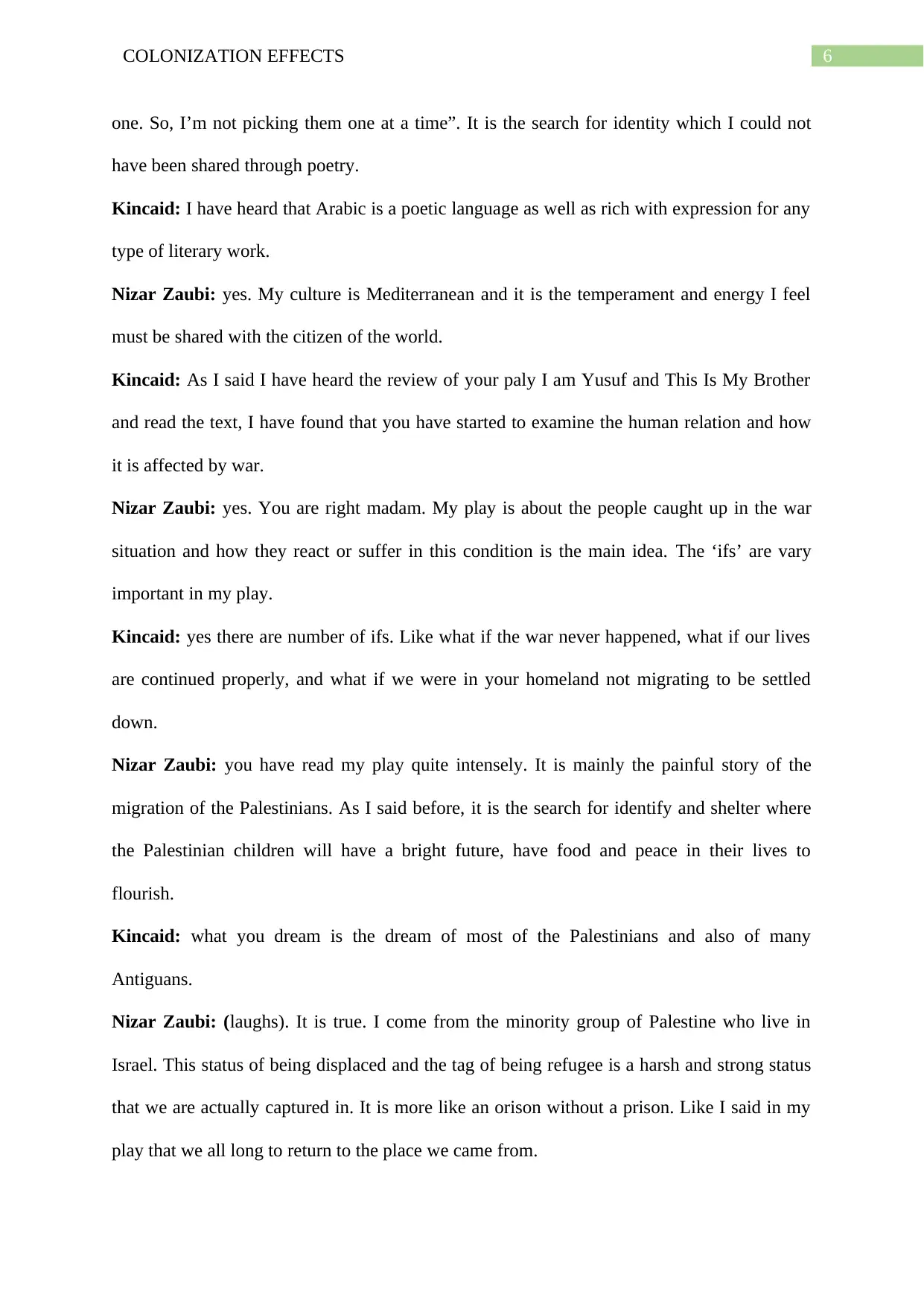
6COLONIZATION EFFECTS
one. So, I’m not picking them one at a time”. It is the search for identity which I could not
have been shared through poetry.
Kincaid: I have heard that Arabic is a poetic language as well as rich with expression for any
type of literary work.
Nizar Zaubi: yes. My culture is Mediterranean and it is the temperament and energy I feel
must be shared with the citizen of the world.
Kincaid: As I said I have heard the review of your paly I am Yusuf and This Is My Brother
and read the text, I have found that you have started to examine the human relation and how
it is affected by war.
Nizar Zaubi: yes. You are right madam. My play is about the people caught up in the war
situation and how they react or suffer in this condition is the main idea. The ‘ifs’ are vary
important in my play.
Kincaid: yes there are number of ifs. Like what if the war never happened, what if our lives
are continued properly, and what if we were in your homeland not migrating to be settled
down.
Nizar Zaubi: you have read my play quite intensely. It is mainly the painful story of the
migration of the Palestinians. As I said before, it is the search for identify and shelter where
the Palestinian children will have a bright future, have food and peace in their lives to
flourish.
Kincaid: what you dream is the dream of most of the Palestinians and also of many
Antiguans.
Nizar Zaubi: (laughs). It is true. I come from the minority group of Palestine who live in
Israel. This status of being displaced and the tag of being refugee is a harsh and strong status
that we are actually captured in. It is more like an orison without a prison. Like I said in my
play that we all long to return to the place we came from.
one. So, I’m not picking them one at a time”. It is the search for identity which I could not
have been shared through poetry.
Kincaid: I have heard that Arabic is a poetic language as well as rich with expression for any
type of literary work.
Nizar Zaubi: yes. My culture is Mediterranean and it is the temperament and energy I feel
must be shared with the citizen of the world.
Kincaid: As I said I have heard the review of your paly I am Yusuf and This Is My Brother
and read the text, I have found that you have started to examine the human relation and how
it is affected by war.
Nizar Zaubi: yes. You are right madam. My play is about the people caught up in the war
situation and how they react or suffer in this condition is the main idea. The ‘ifs’ are vary
important in my play.
Kincaid: yes there are number of ifs. Like what if the war never happened, what if our lives
are continued properly, and what if we were in your homeland not migrating to be settled
down.
Nizar Zaubi: you have read my play quite intensely. It is mainly the painful story of the
migration of the Palestinians. As I said before, it is the search for identify and shelter where
the Palestinian children will have a bright future, have food and peace in their lives to
flourish.
Kincaid: what you dream is the dream of most of the Palestinians and also of many
Antiguans.
Nizar Zaubi: (laughs). It is true. I come from the minority group of Palestine who live in
Israel. This status of being displaced and the tag of being refugee is a harsh and strong status
that we are actually captured in. It is more like an orison without a prison. Like I said in my
play that we all long to return to the place we came from.
Paraphrase This Document
Need a fresh take? Get an instant paraphrase of this document with our AI Paraphraser
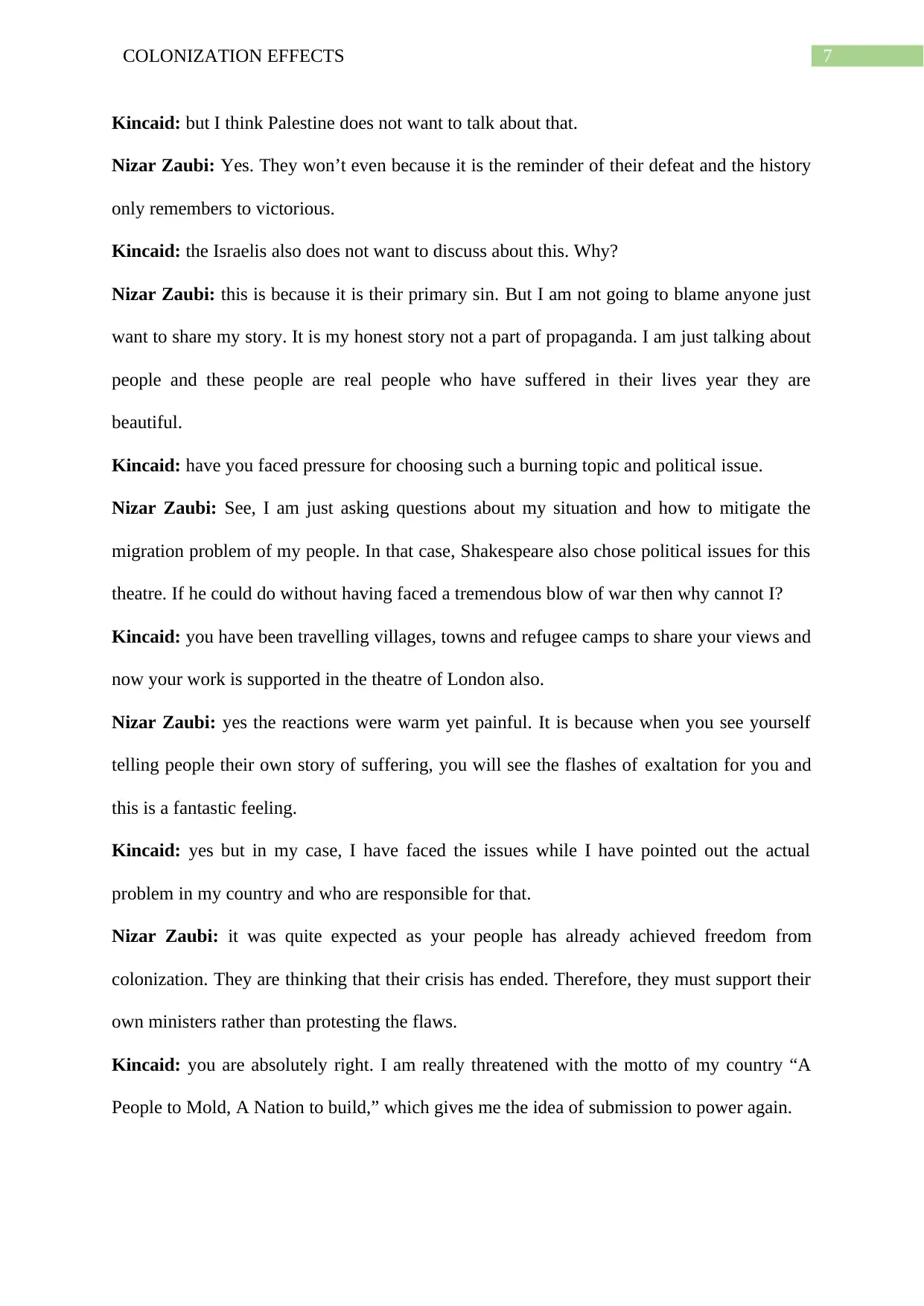
7COLONIZATION EFFECTS
Kincaid: but I think Palestine does not want to talk about that.
Nizar Zaubi: Yes. They won’t even because it is the reminder of their defeat and the history
only remembers to victorious.
Kincaid: the Israelis also does not want to discuss about this. Why?
Nizar Zaubi: this is because it is their primary sin. But I am not going to blame anyone just
want to share my story. It is my honest story not a part of propaganda. I am just talking about
people and these people are real people who have suffered in their lives year they are
beautiful.
Kincaid: have you faced pressure for choosing such a burning topic and political issue.
Nizar Zaubi: See, I am just asking questions about my situation and how to mitigate the
migration problem of my people. In that case, Shakespeare also chose political issues for this
theatre. If he could do without having faced a tremendous blow of war then why cannot I?
Kincaid: you have been travelling villages, towns and refugee camps to share your views and
now your work is supported in the theatre of London also.
Nizar Zaubi: yes the reactions were warm yet painful. It is because when you see yourself
telling people their own story of suffering, you will see the flashes of exaltation for you and
this is a fantastic feeling.
Kincaid: yes but in my case, I have faced the issues while I have pointed out the actual
problem in my country and who are responsible for that.
Nizar Zaubi: it was quite expected as your people has already achieved freedom from
colonization. They are thinking that their crisis has ended. Therefore, they must support their
own ministers rather than protesting the flaws.
Kincaid: you are absolutely right. I am really threatened with the motto of my country “A
People to Mold, A Nation to build,” which gives me the idea of submission to power again.
Kincaid: but I think Palestine does not want to talk about that.
Nizar Zaubi: Yes. They won’t even because it is the reminder of their defeat and the history
only remembers to victorious.
Kincaid: the Israelis also does not want to discuss about this. Why?
Nizar Zaubi: this is because it is their primary sin. But I am not going to blame anyone just
want to share my story. It is my honest story not a part of propaganda. I am just talking about
people and these people are real people who have suffered in their lives year they are
beautiful.
Kincaid: have you faced pressure for choosing such a burning topic and political issue.
Nizar Zaubi: See, I am just asking questions about my situation and how to mitigate the
migration problem of my people. In that case, Shakespeare also chose political issues for this
theatre. If he could do without having faced a tremendous blow of war then why cannot I?
Kincaid: you have been travelling villages, towns and refugee camps to share your views and
now your work is supported in the theatre of London also.
Nizar Zaubi: yes the reactions were warm yet painful. It is because when you see yourself
telling people their own story of suffering, you will see the flashes of exaltation for you and
this is a fantastic feeling.
Kincaid: yes but in my case, I have faced the issues while I have pointed out the actual
problem in my country and who are responsible for that.
Nizar Zaubi: it was quite expected as your people has already achieved freedom from
colonization. They are thinking that their crisis has ended. Therefore, they must support their
own ministers rather than protesting the flaws.
Kincaid: you are absolutely right. I am really threatened with the motto of my country “A
People to Mold, A Nation to build,” which gives me the idea of submission to power again.
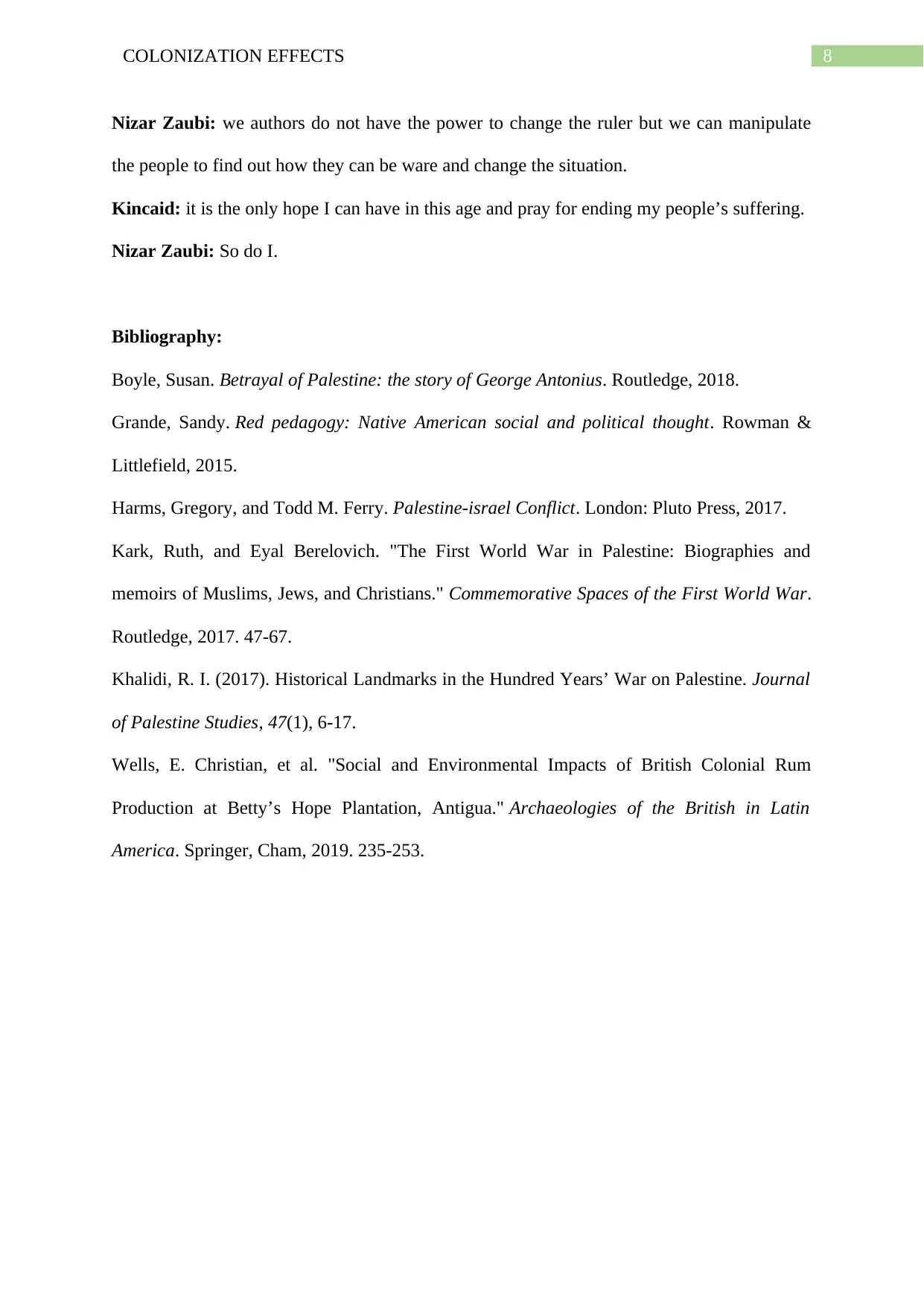
8COLONIZATION EFFECTS
Nizar Zaubi: we authors do not have the power to change the ruler but we can manipulate
the people to find out how they can be ware and change the situation.
Kincaid: it is the only hope I can have in this age and pray for ending my people’s suffering.
Nizar Zaubi: So do I.
Bibliography:
Boyle, Susan. Betrayal of Palestine: the story of George Antonius. Routledge, 2018.
Grande, Sandy. Red pedagogy: Native American social and political thought. Rowman &
Littlefield, 2015.
Harms, Gregory, and Todd M. Ferry. Palestine-israel Conflict. London: Pluto Press, 2017.
Kark, Ruth, and Eyal Berelovich. "The First World War in Palestine: Biographies and
memoirs of Muslims, Jews, and Christians." Commemorative Spaces of the First World War.
Routledge, 2017. 47-67.
Khalidi, R. I. (2017). Historical Landmarks in the Hundred Years’ War on Palestine. Journal
of Palestine Studies, 47(1), 6-17.
Wells, E. Christian, et al. "Social and Environmental Impacts of British Colonial Rum
Production at Betty’s Hope Plantation, Antigua." Archaeologies of the British in Latin
America. Springer, Cham, 2019. 235-253.
Nizar Zaubi: we authors do not have the power to change the ruler but we can manipulate
the people to find out how they can be ware and change the situation.
Kincaid: it is the only hope I can have in this age and pray for ending my people’s suffering.
Nizar Zaubi: So do I.
Bibliography:
Boyle, Susan. Betrayal of Palestine: the story of George Antonius. Routledge, 2018.
Grande, Sandy. Red pedagogy: Native American social and political thought. Rowman &
Littlefield, 2015.
Harms, Gregory, and Todd M. Ferry. Palestine-israel Conflict. London: Pluto Press, 2017.
Kark, Ruth, and Eyal Berelovich. "The First World War in Palestine: Biographies and
memoirs of Muslims, Jews, and Christians." Commemorative Spaces of the First World War.
Routledge, 2017. 47-67.
Khalidi, R. I. (2017). Historical Landmarks in the Hundred Years’ War on Palestine. Journal
of Palestine Studies, 47(1), 6-17.
Wells, E. Christian, et al. "Social and Environmental Impacts of British Colonial Rum
Production at Betty’s Hope Plantation, Antigua." Archaeologies of the British in Latin
America. Springer, Cham, 2019. 235-253.
⊘ This is a preview!⊘
Do you want full access?
Subscribe today to unlock all pages.

Trusted by 1+ million students worldwide
1 out of 9
Your All-in-One AI-Powered Toolkit for Academic Success.
+13062052269
info@desklib.com
Available 24*7 on WhatsApp / Email
![[object Object]](/_next/static/media/star-bottom.7253800d.svg)
Unlock your academic potential
Copyright © 2020–2026 A2Z Services. All Rights Reserved. Developed and managed by ZUCOL.